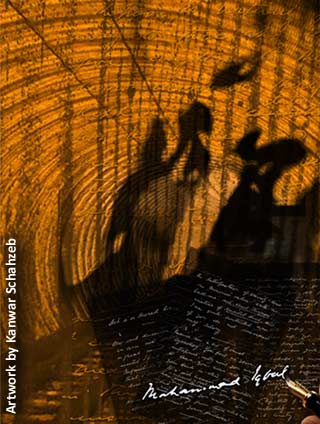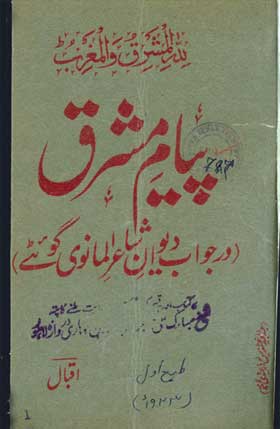|
|
Search the Republic of Rumi
|
|
| 
|
The
Works of Iqbal
|
Collected Works
| Secrets
and Mysteries
The first book of Iqbal's poetry introduces
the poet as a seer who has appeared on the scene for telling
"something that no on has told before." He is
the voice of the poet of tomorrow, commanded by the spirit
of Mawlana Rumi (1207-1273) to reveal the secrets of life
that revolve around the concept of selfhood, his message
is an offshoot of the Muslim nation (which is established
in the poem as a primordial entity) and the readers must
pay attention to his message rather than the poetic dimensions
of his work. Thus establishing the scope and purpose of
his message, the poet goes in to elucidate the significance
of the individual in the life of a nation in the first part
titled 'Secrets of the Self' and the significance of society
for an individual in the second part. Islamic concept of
a Muslim and the philosophy of Muslim nationhood is elaborated
in detail as practical implications of these propositions
but the ideas in this book might be applicable to other
models according to the needs and ideals of their followers.
Originally in Persian verse. Translations available. 1915-1922.
Read more... |
The
Message of the East
|

|
|
Contents
Read online
Read translation |
The second book informs the reader that Nature
itself has started created in the deepest recesses of life
a new type of human being and a new world for him –
apparently the same as envisioned by the Poet in the previous
book. Glimpses of this new world are offered in poems where
Rumi, Goethe and other poets of East and West hold conversations
in heavens – something that seemed remarkably unusual
at that time but which has become an apt analogy for the
kind of cultural exchanges that have been happening since
then. Envisioning these changes in the near future, the
poet has compiled this book as a loving response to the
Divan of the German poet-philosopher Goethe composed
almost a hundred years earlier. Historically, the book also
marks the cut-off point where the "tutelage" of
the West, accepted by the East in the nineteenth century,
must come to an end. Europe, partially due to its conservatism
and partially due to dilapidation of the life forces after
the First World War (1914-18), is unlikely to grasp the
significance of the brave new world while the East, especially
the Muslim East, apparently seems to be naturally suitable
for taking the lead since it has reawakened after a long
slumber – just like Germany of a century before. Originally
in Persian verse. Translations available. 1923. Read
more... |
The
Call of the Marching Bell
The third book calls upon the readers to follow
the Poet towards the new world foreseen in the previous
work. Anthologizing a rich selection of poems from his earliest
days (about fifteen years before the publication of the
first book), the Poet offers a biography of his mind and
traces the gradual transformation of his ideas – not
as a process of discarding one idea for the sake of another
but rather as a perpetual discovery of deeper layers contained
in the same truth. Following the Poet through his personal
journey and diverse readings of life and books, the readers
arrive witness the natural culmination of the process through
the appearance of the legendary guide Khizr who reveals
the secrets of the new world that Nature has built for the
new type of human being in the deepest recesses of life.
In the last poem, 'The Dawn of Islam', this is presented
as an inside-out world where moral values have become more
effective than steel, the hidden forces of history stand
revealed for those who dare. Tables have turned and those
who were considered the least qualified have actually become
the most suitable for grasping the new possibilities offered
by this world. However, even in such a new and noble era,
greed still lurks in the hearts of the oppressed as well
as the oppressors, due to which they may fail to see the
real potential of their times. Originally in Urdu verse.
Translations available. 1924. Read
more... |
Persian
Psalms
The fourth book is intended for purifying
the souls of the nations so that they may also see the world
as it appears to the Poet (who now assumes the status of
a "qalandar"). The tools offered for this purpose
are: (a) a series of 56 monologues addressed to God; (b)
a series of 75 monologues addressed to humanity; (c) a summary
of the Poet's worldview in the form of nine profound questions
and their short answers pertaining to thought, knowledge,
union, separation, self, selflessness, perfection, 'I'm
the Creative Truth' and awareness; and (d) list of examples
from the art and religion of slaves as compared to the art
of the free people. The process involves the discovery of
a unity between the individual ego (the reader), the collective
ego of humanity and the Ultimate Ego (God). Freedom comes
from realizing the relationship between these and slavery
is a state where this relationship is abrogated due to the
slave’s deference to rulers and false idols. Hence
the book contains a timely warning for the emerging nations
of the East that the fetters are on hearts and souls rather
than on hands or feet. Originally in Persian verse. Translations
available. 1927. Read more... |
Javid
nama
The fifth book is an epic that depicts the
process of the formulation of a new world in the soul of
humanity. The process has seven stages, respectively symbolized
by Moon, Mercury, Venus, Mars, Jupiter, Saturn and 'Beyond
the Spheres'. Mawlana Rumi takes the Poet through a spiritual
tour of these stations in search of immortality. The last
stage is the Paradise where luminaries from other religions
are also present, such as the ancient Hindu sage Bhartari
Hari. The journey culminates in the Poet's private meeting
with God where God defines nation as "thousands of
eyes having a single vision". The destiny of humanity
is revealed before the Poet on his request but he faints
on beholding the vision. In the epilogue, he addresses his
son Javid and the posterity from his grave – a subtle
indication that he has attained the immortality he was looking
for. Originally in Persian verse. Translations available.
1932. Read more... |
Gabriel's
Wing
The structure of the sixth book is reminiscent
of almost every book that has gone before, especially Persian
Psalms, since there is similarity in the purpose of
both works: the earlier work was supposed to prepare the
reader to behold the overwhelming vision of Javid Nama
whereas the present one offers a space for recuperation
afterwards. The first part of the book consists of (a) a
series of 16 monologues addressed to God; and (b) a series
of 61 monologues addressed to the humanity. The second part
consists of poems reflecting on various aspects of Nature,
history and the contemporary world from a remarkably impartial
perspective as if the reader is being asked to empathize
with all nations of the world at least at this stage. Originally
in Urdu verse. Translations available. 1935. Read
more... |
The
Blow of Moses
Aptly sub-titled "a declaration of war
against the present age", the seventh book can be read
like a do-it-yourself kit for transforming the world according
to the spiritual vision witnessed in Javid Nama. The
first five sections respectively alter the general perceptions
about (a) Islam and the Muslim; (b) Education and Training;
(c) Woman; (d) Art and Literature; and (e) Politics of East
and West. The last section consists of 20 dramatic monologues
of a fictitious character Mihrab Gul Afghan, apparently
a thinking person from the tribal areas of Pakistan or Afghanistan
who is about to become internally displaced for opposing
Western imperialism. Originally in Urdu verse. Translations
available. 1936. Read more... |
What
Should Now Be Done, O Nations of the East?
The eighth book invites all the nations of
the East to become like a single organism so that they may
replace the "Pharaonic Wisdom" currently prevailing
in the world with "the Wisdom of Moses" and pave
the way for a unity of humankind through economic, spiritual
and political empowerment of everyone. In the second part
of the book, the Poet travels into "the heart of Asia"
– Afghanistan, according to him – and gives
hints about the hidden implications of the messages of some
of the sages whose tombs are visited in the journey. Originally
in Persian verse. Translations available. 1937. Read
more... |
The
Gift of Hijaz
The ninth book is the final work of Iqbal's
poetry and came out a few months after his death. The journey
on which he took along the readers with him thus culminates
on a gift from Hijaz (the part of Arabia associated with
the Holy Prophet, peace be upon him). The gift is for everyone:
the first part, which is in Persian, consists of five sections
respectively addressed to (a) God; (b) the Holy Prophet;
(c) the Muslim Nation; (d) the Humanity; and (e) the Like-Minded.
The second part, consisting of Urdu poems, includes a vision
of the Devil's "Parliament" asks his counselors
to concentrate their work against the Muslim nation since
Islam has the potential of challenging a diabolical and
unjust world order on behalf of the entire humanity. Originally
in Persian and Urdu verse. Translations available. 1938.
Read more... |
The
Reconstruction of Religious Thought in Islam
This is the only prose work that Iqbal got
registered through copyright like the nine books of his
poetry. Iqbal perceives the humanity to be an organic unity
that has been developing like a single individual through
history. The work of Islam, having started more than a thousand
years ago, has succeeded in facilitating the cognitive development
of the humanity up to the stage of concrete thought where
a new method of spiritual development is required. The seven
lectures of this book are supposed to work as a provisional
solution in the absence of such a method or perhaps even
facilitate its discovery. Accepting Nature, history and
intuition as faculties of knowledge, Iqbal concludes that
religion its higher form empowers the individual for a direct
vision of Reality and the ultimate aim of Islam is a spiritual
democracy that was inconceivable in the past. In English
prose. 1930-1934. Read more... |
Allahabad
Address
Iqbal proposed and predicted the birth of
a Muslim state in North-West India as an initial practical
step towards the creation of the new world order envisioned
in his other works. He explained that the state was going
to be a means for realizing the organic unity of humankind.
In his opinion, it was threatened by two handicaps: (a)
dearth of leaders with insight into the spirit as well as
destiny of Islam and the trends of modern history; and (b)
a speedy decrease in the collective instinct in the community.
Against all odds, and under the able leadership of Quaid-i-Azam
Muhammad Ali Jinnah, the Muslim community of the sub-continent
created the state through a fair and free election. Pakistan
emerged on the map of the world in 1947 – just as
Iqbal had foreseen seventeen years before, having the strengths
he had promised and threatened by the weaknesses against
which he had forewarned. What other possibilities lie hidden
in the depths of Time is yet to be seen but may be understood
better by achieving "a real collective ego." In
English prose, originally distributed as printed text of
the presidential address delivered at the annual session
of All-India Muslim League in Allahabad on December 29,
1930. Read more... |
Uncollected Works
| Uncollected
published writings |
| Correspondence |
| Unpublished
drafts |
| Reported
statements and attibutions |
| Next
|
|
 Special
thanks to
Special
thanks to 

